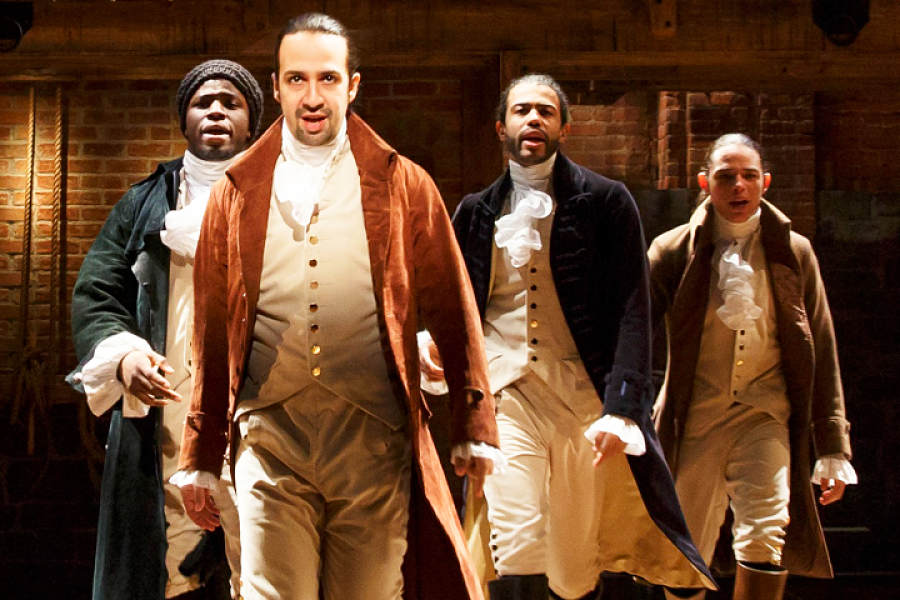On the cover of its Playbill, a refrain from Lin-Manuel Miranda’s new musical Hamilton is reprinted: “Who Lives, Who Dies, Who Tells Your Story.” This would seem an apparent reference to Alexander Hamilton’s complex legacy and infamous murder at the hands of Aaron Burr in a half-fought duel in 1804. But that notion—who lives, who dies, who tells your story—seems more of a contemporary hip-hop paradigm than it does a celebration of an unsung founding father. Of course, this is open to interpretation.
As a theatre artist and hip-hop-head, I have always bristled at the use of rap or other hip-hop elements in theatre when it comes to the telling of over-told stories, particularly ones by and about long-dead white people. I have been known to declare the use of rap in Shakespeare plays, for instance, a cultural crime, not so much for the co-opting of poor people’s art forms to further rich people’s cultural agendas, but more for the devaluation and erasure of living poor people’s stories and their substitution by storytellers who died 500 years ago—as if the hip-hop generation has no stories of its own worthy of theatrical production in an age when theatres are desperate to “cultivate new audiences.”
Hamilton, however, which will soon close at the Public Theater and head for Broadway this summer, is a highly strategic coup d’état, its own duel of sorts, between ruling-class-approved theatrical storytelling and keen subversion by a generation of theatre artists of color who have recast themselves as white founding fathers. I forewarn you that my following commentary might read like a list of “Reasons Why Lin-Manuel Miranda Is a Genius.” Or you might find it highly contradictory. But as in most hip-hop narratives: All of it is true.
First, the idea that a musical rooted in hip-hop sensibility must be a founding-father American history story in order to be seen as commercially viable on Broadway is completely fucked up. It’s even more fucked up that slave owners like Washington, Jefferson and Madison are essentially co-heroes of this play. Yet LMM has flipped the script by casting all the main players with formidably talented actors who are themselves descendants of the immigrants and slaves notably missing from the mainstream story of the founding of the U.S., and barely referred to in the play. This deliberate and cunning move by LMM (and his director, Thomas Kail) is as deft as Hamilton’s deal with Jefferson to keep the banks in New York and move the U.S. capital down south. Gotcha, bitches!
Granted, I probably do not see enough Broadway-style musicals. But aside from Passing Strange, this might be the first time I’ve ever seen a majority cast of non-white actors in front of a majority white audience tell an American story that was not Dreamgirls. And even though the colored folk here might be singin’ and dancin’, Hamilton is not about them singing and dancing. So in some sense I feel like we have arrived. Similar to how I felt when Obama was elected. I’m not exactly sure where we’ve arrived to, but it’s somewhere further than where we were previously. It’s a game-changer.
Now, I’ll be the first to admit that most of the time when rap rhythms are thrust into a theatre context, it doesn’t work. Either the theatre part hasn’t been thought out, or the rap is merely a gimmicky accessory misunderstood by the creators. But Hamilton commendably fulfills both the hip-hop and the theatrical requirements. It simultaneously betrays certain fundamentals of both hip-hop and theatre and stays true to both forms in order to upend, reinvent, retell and reclaim both history and musical theatre. In other words, they flipped that shit. Which, at the end of the day, is truly hip-hop.
What’s more, in an impressive feat of writing, LMM gets the audience to care about actual American history, spinning it into a story about honor which is at once ironic, contradictory, conciliatory, provocative, subversive, educational, entertaining and human. That, folks, is great theatre.

Lamentably, however, much of the acclaim that has and will accrue to Hamilton brands it as one of the first pieces of theatre to successfully incorporate hip-hop elements and sensibilities. That’s like someone thinking they’ve discovered rap music after hearing Eminem’s song “Stan” (coincidentally, and arguably, another white narrative). This is unfortunate; it not only ignores the 20-plus year legacy of hip-hop theatre in the U.S.—Idris Goodwin, Eisa Davis, Psalmeyene 24, Hip-Hop Theatre Junction, Teo Castellanos, Will Power, Universes, Marc Bamuthi Joseph, etc. It also, more disturbingly, ignores LMM’s own In The Heights, a hip-hop-infused musical with a contemporary story about Latinos in a changing neighborhood that ran on Broadway for 3 years, won 4 Tonys and recouped its money after just 10 months. Yet we’re still in a cultural landscape where In The Heights and other hip-hop generation stories will never be celebrated to the extent that Hamilton will be, simply by virtue of who the show is about.
Yes, Hamilton deserves much celebration—but for the right reasons. We shall soon see whether the result of Hamilton’s move to Broadway will create more opportunities for hip-hop generation stories to be told on the Great White Way, or if it will serve merely as a model for other “classic histories” that co-opt hip-hop’s cultural elements without any actual cultural reparations. Instead of “Who Lives, Who Dies, Who Tells Your Story,” I feel like the cover of most Playbills in the U.S. should read, “Who Plays, Who Pays, Whose Story Gets Told?” In essence, that is a question Lin-Manuel Miranda has already asked himself—and answered in a most Hamiltonian way, and in true hip-hop form, by writing like he’s running out of time.
Just don’t get in any duels, Lin-Manuel. And if you do, don’t shoot in the air—we need you.
Danny Hoch is a playwright and actor and founder of the Hip-Hop Theatre Festival.


